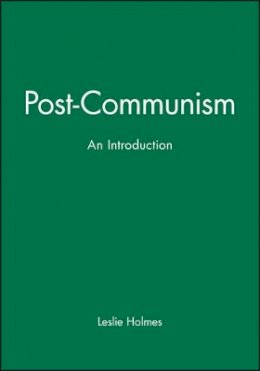
Stock image for illustration purposes only - book cover, edition or condition may vary.
Post-Communism: An Introduction
Leslie Holmes
€ 94.36
FREE Delivery in Ireland
Description for Post-Communism: An Introduction
Hardback. aeo First single--authored, comprehensive introduction to post--communism. aeo A thematic, comparative approach which also includes brief histories of each of the former communist states and a wealth of information. aeo A well--known author with an established reputation in this area. Num Pages: 400 pages, 0. BIC Classification: 1DV; 3JJPN; 3JJPR; JPA; JPFC. Category: (P) Professional & Vocational; (UP) Postgraduate, Research & Scholarly; (UU) Undergraduate. Dimension: 255 x 178 x 34. Weight in Grams: 828.
In this new book, Leslie Holmes provides the first comprehensive single-authored analysis of post-communism. He highlights and explains both the positive and negative aspects of post-communism in the political, economic, and social spheres. Throughout, the policies and structures of late communism are compared to the situation existing now in the ex-communist countries. The result is a comprehensive and accessible introduction to one of the most major events this century.
In this new book, Leslie Holmes provides the first comprehensive single-authored analysis of post-communism. He highlights and explains both the positive and negative aspects of post-communism in the political, economic, and social spheres. Throughout, the policies and structures of late communism are compared to the situation existing now in the ex-communist countries. The result is a comprehensive and accessible introduction to one of the most major events this century.
Product Details
Format
Hardback
Publication date
1997
Publisher
John Wiley and Sons Ltd United Kingdom
Number of pages
400
Condition
New
Number of Pages
400
Place of Publication
Oxford, United Kingdom
ISBN
9780745613116
SKU
V9780745613116
Shipping Time
Usually ships in 7 to 11 working days
Ref
99-1
About Leslie Holmes
Leslie Holmes is the author of Post-Communism: An Introduction, published by Wiley.
Reviews for Post-Communism: An Introduction
"While the daily news from East Europe has provided many of us with a continuous sense of surprise and uncertainty ever since 1989, Holmes has sat down to write a masterful, as well as daring, synthetic account of what is going on in the region. The reader of this ambitious exercise in real time historiography, including the undergraduate beginner in the emerging sub-discipline of East European 'transitology', is offered a wealth of country portraits, original typologies, and systematic 'before-and-after' comparisons. Both in its conceptual and empirical parts, the book is a highly stimulating and insightful companion to any observer of East European history in the making." Claus Offe, Humboldt University, Berlin "As well-informed as it is broad-ranging, the book pays due attention to historical context as well as to political, social and economic change in the 1990s." Archie Brown, St Antony's College, Oxford "Clearly written and comprehensive in its scope, this is probably the best introduction to the politics of post-communism that is currently available." Stephen White, University of Glasgow "Holmes has done a great service in attempting to define post-communism. He has brought together a massive amount of data from nearly 30 countries and provided real insight through his organisation and interpretation." Survival "Leslie Holmes has written an encyclopedic introduction to post-communism as it exists in the former communist states of Eastern Europe and the former USSR ... His discussion ranges widely across countries, concepts and empirical data. Stimulating in many of the points he makes, and insightful. This book is a mine of useful information, a fine introduction to the subject.' Australian Journal of Political Science "[A] fine book." Political Studies "Holmes's volume is a very readable textbook and a comprehensive analysis of post-communism in theorectical as well as practical terms. It offers a comparision of late communism and early post-communism and highlights general phenomena in a comparative context." G?bor Stojanovits, Loughborough University, Journal of European Area Studies
